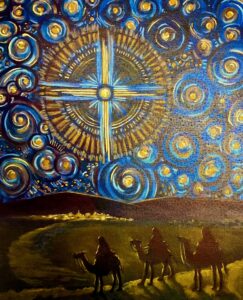
Isaiah spoke words of hope the people desperately needed to hear—dead stumps springing back into life, lions laying with lambs, an end to war and a future of peace.
The Israelites felt hopeless, in despair. The words Isaiah wrote told of that despairing and proclaimed that the door that opened up to future hope was not completely closed. There may yet be some gate of hope the people could get through.
In ancient Chinese medicine, there is a powerful acupuncture point called “the gate of hope.” When a person is despondent, opening up the gate of hope allows one to see a bright and clear future. Chinese acupuncture physicians believe that the healing of the body is connected to the health of the mind and the spirit.
The Chinese have never given up that belief, and western physicians now know that there is a great deal of validity to the body, mind and spirit connection.
In classical Chinese acupuncture, thin needles are inserted at tiny points on the body. This opens up blocked energy paths or meridians. When a certain meridian is blocked, there is no flow of energy or chi, and the result is that an organ of the body experiences illness. That same blocked energy causes specific emotional and spiritual distress.
When energy is flowing through the gate of hope, it opens the way for a flood of hopefulness to come into the soul.
The Chinese have known for centuries what modern scientific researchers and behavioural specialists have now proven as truth–that with all hope lost, the spirit of life is gone, and a person can actually die. With hope completely gone, there is no life.
Perhaps Isaiah felt that there was no hope and no life when he prophesied about the stump of Jesse. 3,000 citizens of Jerusalem – including their King, the queen mother, and the city’s leading officials – had been deported as captives to Babylon. Turmoil continued, and eleven years later, the land of Judah took the final blow. Jerusalem was captured and destroyed after suffering unspeakable hardship at the ruthless hands of the Babylonian army.
It was late in the life and ministry of the aged prophet. Isaiah searched the horizon for some sign of the coming Messiah. Patiently, and sometimes not so patiently, the prophet waited for a divine occurrence that would change the world and change his life.
He watched with deep longing for hints of future hope. But the years of waiting grew long, the prophet grew old, and the possibility of giving up hope had, no doubt, crossed his mind.
Yet Isaiah continued to watch and wait, all the time proclaiming – more eloquently than any other prophet – the Messianic hope. In lavish poetry, Isaiah wrote of the time when hope would be restored, when wars would be no more, when the unblemished age would begin.
He spoke of a world of righteousness. He declared that the people must never give up hope.
But we must know that Isaiah was no superhuman messenger dwelling in a state of religious ecstasy and completely unaware of the tragic reality of his world. We need to know that Isaiah might well have reached the end of his rope, the end of his hope. He might very well have closed his prophetic mind, laid down his responsibility before a seemingly unresponsive God, and said, “Too many years! Too long without a single sign! I have wasted my breath proclaiming this messianic hope that never shows even a glimmer of possibility. I give up! I quit! Get yourselves another prophet who can make you feel better. I’m all out of words, completely out of energy, and utterly out of hope.”
But somehow Isaiah’s gate of hope must have opened, because he never stopped speaking of the coming messianic hope. He never gave up, even though his prophecy was born out of his intense anguish of soul.
The prophet fully expected the coming of the Messiah to occur in his own day. How could he have known that the fulfilment of the glorious and hopeful future he longed to see would delay for another seven centuries? Could it be that even the aging prophet who spoke most gloriously of Israel’s hope, at times felt the personal despair of feeling that all hope was gone?
Many people live in utter hopelessness. For multitudes of people, people that you and I see every day, hope is lost! And when one is left without any hope at all, that person is left standing helplessly in a pile of dead dreams. Not a very glorious Advent picture . . .
· No angels promising any miracle happenings
· No brilliant star in the night sky lighting a path to a place of promise
· No divine new birth that wondrously shatters the natural order of things
· No fresh renewal of hope in hearts that have endured a year’s worth of disappointment!
Sometimes there is much more disappointment in our hearts than hope!
You have probably not seen a single angel this Advent season. Nor have we noticed any sort of unusually bright star in the darkness. Our world is in a bit of a state.
But this is Advent! This is the season when hope can rise within us as fresh as the dawn. This is the season for shouting “Don’t give up hope yet! There is more to us than meets the eye. There is more to this situation that meets the eye.”
If we seek anything from Advent–anything other than crowded shops, traffic jams and nowhere to park and . . . If we are searching through Advent for anything at all, we are counting on the fact that hope really can flood our spirits, and fill our hearts, and drench our souls, and even rush through our energy pathways creating an astounding surge of chi.
Think for a moment about what attacks your hope. Illness, or family turmoil, or grief, or rejection.
Unfortunately, hope does not just kick in all by itself, demolish all our trouble, and make us instantly feel better. It is a choice. We choose to hope, to be hope-ful.
Holy and divine hope labours and moves and strives within us!
Holy and divine hope comes as a gift from God, and it enters our despairing places and weaves together the broken pieces of our lives in new and unexpected ways. Hope “sees” what we cannot readily see. Hope learns to see in the dark. Most of all, hope learns and discerns every despairing moment of our past and unyieldingly refuses to let us view that past as a complete loss.
This time of year can be a season of depression. Right in the middle of the hype that touts Christmas as the “happiest time of the year,” millions of people dwell in their own reality that contrasts Christmas feasting with poverty and hunger, or lavish Christmas gifts with not enough money to buy any gifts at all. And with our cost of living crisis this is certainly a reality for many.
How stark a contrast between a family feast filled with love, and scenes that are so opposite: a family table with an empty chair that screams of a painful absence, a family celebration sparked with family strife. This season can be NOT at all the happiest time of the year!
Perhaps that’s why Isaiah is such a credible and expressive prophet of Advent’s hope . . . because he never saw that hope in his own lifetime. He knew the anguish of unfulfilled expectations. He knew, like we know, the agony of waiting in hopelessness and helplessness.
Just as John the Baptist knew. When we hear John’s impassioned words during Advent, we hear the cries of another prophet with unfulfilled expectations. Because John died without knowing whether Jesus would bring his prophesies to fulfilment. He died not knowing if his hopes were realized.
This Advent season will still find the homeless shivering in the cold, and children struggling to survive family violence, and people coping with profound loss. In this world, it is difficult to shout words of hope.
But we have a sure and certain hope found in the arms of an ever loving and ever lasting God. We have the light of Christ shining in us and through us and like Isaiah and John the Baptist we can have the faith to persevere and to point to Jesus. To a future that is bright.
Advent is all about waiting. But we wait with expectation, with hope and with joy. All of which our world so desperately needs right now. So let us be the beacons of hope and joy in our community – where this week can you spread a little love? A thank you, a kind word, a smile? Let us be agents of advent – showing love and compassion, sharing words of hope and encouragement through our words and our deeds.
Father, we thank you for the gift of hope. The gift of love. The gracious gift of your Son shining a light in the darkness. And as we wait this advent we ask that you would fill us afresh with your life-giving Spirit that we may agents of advent and scatter your hope and love with extravagant abandon. In your name we pray Amen.

If you would like to apply for a Login account to help update this site, please email the web team here.